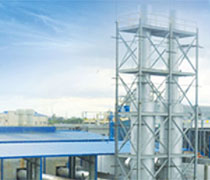Power and development for Bangladesh

Meghna Group of Industries is one of the leading business conglomerates in Bangladesh. It is a family-owned group which turnover comes mainly from food and other branded staples. Many of its industrial units operate in Meghnaghat Industrial Park on the outskirts of the capital, Dhaka.
The industrial park already has a captive 60 megawatt power station. Everest Power Generation, a Meghna group company, is now augmenting this with additional 19 megawatt plant. The new power plant will play a key role in the group’s expansion into new projects.
Employment for the poor
Some 6,700 Meghna employees work in the industrial park. The new power plant will indirectly support the creation of about 600 new jobs in an area that suffers from poverty.
Another way in which the plant will benefit the residents of the surrounding rural area is that any surplus electricity will be sold to the national power grid. Without a new power station, the industrial park would draw electricity from the national grid.
In Bangladesh the per capita consumption of electricity is one of the lowest in the world. Only about half of its 155 million inhabitants are within the reach of the power grid and power failures are common.
Power generating equipment from Wärtsilä
The total cost of the investment is about 21 million US dollars. It is being financed by Everest shareholders and loans from Finnfund and Standard Chartered Bank Bangladesh.
The main power generating equipment has been supplied by Wärtsilä, and was manufactured in Vaasa, Finland. The power station will run on natural gas, acquired from the national gas company.
Wärtsilä’s equipment represents the best available technology. Its emissions are well below the average produced by power stations based on other fossil fuels. Plant efficiency, as a direct benefit, will be further boosted by utilising the heat it produces and there will be reduction in pollution as indirect benefit. Because of the plant’s efficiency and low emissions, its owner can seek to sell certified emission reductions in line with the Clean Development Mechanism.
As a development finance institution, Finnfund has played a key role in facilitating the project. Despite the prominent position of the Meghna Group, it has a limited access to finance because local commercial banks are unable to grant long-term foreign currency loans.

